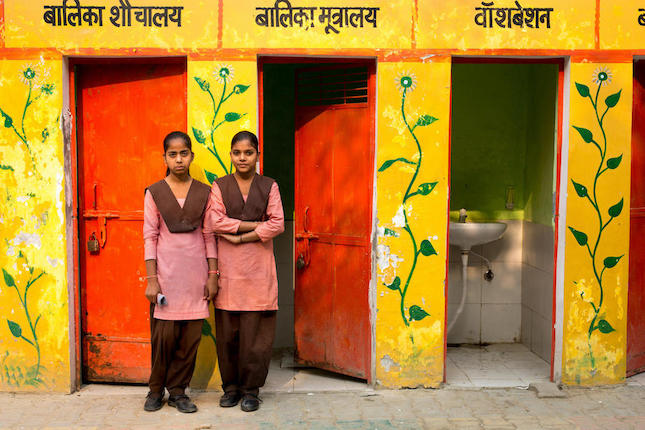The COVID-19 pandemic has amplified the need for better hygiene habits, yet many still do not have access to basic sanitation or water facilities. Sanitation is a fundamental human right. However, a recent study of Joint Monitoring Programs (JMP) conducted by WHO and UNICEF states that 15% of Indians do not have access to toilet facilities. It also says that 3.3% of the rural population and 1.7% of the urban population still lack adequate hygiene services. Similarly, several rural and peri-urban areas across the globe are in dire need of proper sanitation intervention – many children and women suffer from fatal illnesses after being exposed to faecal matter, due to intestinal infections, water and food contamination. As recent as 2020, 2.5 lakh women in India suffered from hygiene-related health issues. All this data stresses upon the fact that urgent action is needed to solve this global health crisis by 2030.
Amidst the ongoing challenges and crises caused by the COVID-19 pandemic, it’s tough to identify any bright sparks when we consider the predominantly negative impact on lives and livelihoods. One of the few positive outcomes was the amplification of the importance of good hygiene, particularly hand washing, as a way of preventing the spread of illness. Despite the many global awareness campaigns around the importance of good hygiene, vast parts of the world remain woefully underserved in the provision of basic hygiene and sanitation access and facilities. The United Nations’ Sustainable Development Goal (UN SDG) 6: Clean Water and Sanitation is one of the worst performing SDGs, according to the latest SDG Insights Report published by B-Lab last month.
The absence of safe and clean toilets also adversely affects children, women and girls the most. Apart from open defecation being a dishonourable experience, it puts women and girls at grave risk of being assaulted every time they step out of their schools and homes – One of the primary reasons for increasing school dropouts amongst young girls when they reach puberty. While the pandemic has amplified the need for water, hygiene and sanitation more than ever, there is still a lot to be done to tackle this surmounting challenge globally.
The United Nations’ Summary Progress Update 2021 report for SDG6 begins with a stark reminder: the world is not on track to achieve it. 1.7 billion people still lack even the most basic of sanitation services, while 3 billion people do not have access to hand hygiene facilities at home. Tackling an issue of this magnitude cannot be the responsibility of governments or NGOs alone. Businesses have a responsibility to work with other agents – public and private – to affect the change that so badly needs to happen. I believe there are several ways in which businesses can play an important role.
Public-private partnership
The UN has predicted that in order to achieve the Sustainable Development Goals (SDG), in particular SDG6, the next 5 years will be crucial in generating national and international leadership, creating more awareness about the sanitation crisis and very importantly, building alliances between the public and private sector. The Toilet Board Coalition, UNICEF, the Japan International Cooperation Agency, WaterAid and more are enabling private sector engagement; connecting large and small companies; and ensuring close collaboration between private, public and non-profit sectors with the common goal to achieve Sustainable Development Goal 6 (SDG6), universal access to sanitation.
Tapping into the multi-billion-dollar marketplace that the Sanitation Economy unlocks is a significant opportunity for businesses and governments globally to generate a meaningful return and net positive value. The Sanitation Economy monetizes toilet provision, products and services, biological resources, data and information to provide benefits across the economy and society. Governments can rid themselves of unaffordable public costs while reaping huge cost avoidance advantages in community health. The private sector can unlock enormous new growth opportunities, and not just in sanitation. Businesses and public entities have been working together on tackling the issue and aligning their efforts, and their collective use of resources can help accelerate their success.
Innovating for impact
Business innovation is a huge accelerator in driving change. There has been a remarkable improvement in sanitation services in India and around the globe in the past few decades. On October 2nd, 2019, the Government of India reached its goal of declaring rural India open-defecation free, much before the deadline. The Swachh Bharat campaign is actively promoting the construction of more toilets and better maintenance standards for existing ones. According to the Swachh Bharat website, the program has resulted in the construction of over 106 million toilets taking India’s rural sanitation coverage up from 39% seven years ago to 100% now. A significant increase in governments’ commitment to sanitation services and technological innovations has greatly improved access to quality services.
The government is boosting investments in these programmes through a special sanitation tax, corporate social responsibility funding and via World Bank loan. Entrepreneurs, investors and corporations are increasingly interested in contributing towards improved sanitation.
Companies are now actively nurturing and embedding a culture of constant and open innovation across every business function, not just for commercial gain but also for wider social good. This culture of innovation drives employees to seek ways to create positive change for our customers but also crucially for communities where we can have a real impact.
A lot of great progress has been made but action is not happening fast enough. We only have 9 years to achieve SDG6, and our only hope of doing so is to work together to address the challenges head-on, accelerate the rate of change and not lose sight of one of the most important SDGs we need to achieve to help end a global health issue.
Views of the author are personal and do not necessarily represent the website’s views.


 Satoshi Konagai is the Leader for LIXIL Water Technology (LWT) Asia Pacific, based in Singapore. He is responsible for leading, developing, and accelerating LIXIL’s water technology business across Asia Pacific, a region poised to be LIXIL’s growth engine. He is also responsible for driving few strategic initiatives across 14 key markets in Asia, including India, Vietnam, Thailand and Indonesia.
Satoshi Konagai is the Leader for LIXIL Water Technology (LWT) Asia Pacific, based in Singapore. He is responsible for leading, developing, and accelerating LIXIL’s water technology business across Asia Pacific, a region poised to be LIXIL’s growth engine. He is also responsible for driving few strategic initiatives across 14 key markets in Asia, including India, Vietnam, Thailand and Indonesia.